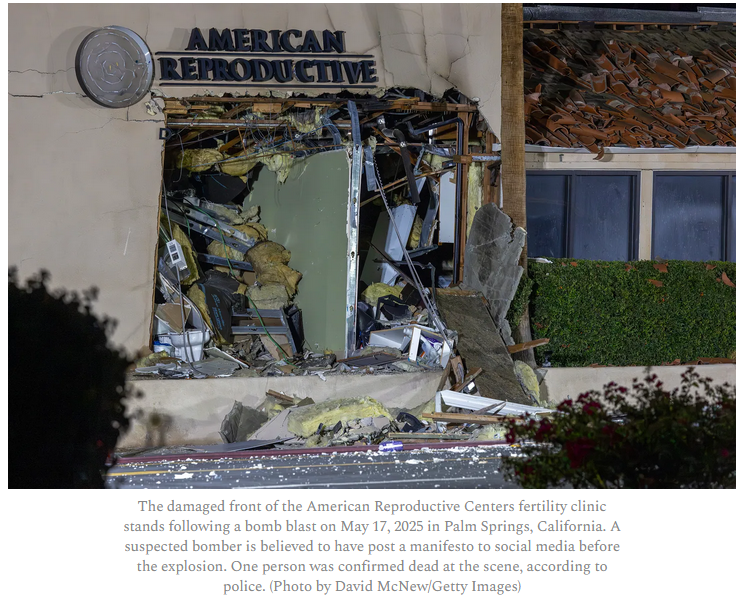Law enforcement can only do so much at one.
By Will Selber, THEBULWARK

PRESIDENT TRUMP’S MASS DEPORTATION POLICY has obvious costs—to the deportees themselves, to their families, to U.S. citizens caught up in the dragnet, to employers and consumers and especially anyone interested in buying food or housing. But there’s a hidden cost that Americans should be more aware of: domestic terrorism.
The collective law-enforcement of this country, from the federal to the local level, only has so much money and so many people. As the president orders the federal agencies to focus on deporting cooks, truck drivers, and farm hands—and encourages state and municipal agencies to help—resources and attention shift away from the most dangerous criminals.
Vance Boelter’s alleged assassination of a state representative and her husband and attempted assassination of several others is only the latest example of meticulously prepared political violence in America. Boelter wore a “hyper-realistic” face mask, a police tactical vest with a badge, and drove an SUV equipped with emergency lights. Before the attack, Boelter used the internet to find the addresses of his potential victims and conducted surveillance on their homes. Fortunately, only two of the four lawmakers Boelter targeted were home during his violent rampage. Earlier this month, Mohamed Sabry Soliman attacked a group demonstrating for the release of Hamas’s Israeli hostages with Molotov cocktails and a makeshift flamethrower in Colorado. Soliman informed law enforcement officials that he had been planning the attack for years.
In late May, Elias Rodriguez executed two staff members of the Israeli Embassy as they were leaving a museum. Surveillance video shows Rodriguez remorselessly following one of the victims as she crawled away, only to reload his weapon and kill her. Al Qaeda in the Arabian Peninsula praised the crime and called upon American Muslims to follow suit.
A week before that attack, Guy Edward Butkus, an anti-natalist, detonated a car bomb outside a fertility clinic, killing himself and wounding four others. A co-conspirator who shared Butkus’s views supplied him with 270 pounds of ammonium nitrate.
Since President Trump’s inauguration, law enforcement officials have detained five individuals, including Ammar Abdulmajid-Mohamed Said, a former Michigan National Guardsman, for providing material support to the Islamic State. Law enforcement officials arrested Said after he used a drone to conduct aerial reconnaissance on a Michigan Army base for his planned mass casualty attack.
On January 1, another former soldier—in fact, an Afghanistan combat veteran—Shamuddin Jabar, killed fourteen people and injured fifty after ramming his car into a crowd on Bourbon Street in New Orleans. The death toll would have been significantly higher had Jabar’s improvised explosive devices detonated as planned.
In less than six months, the United States has endured five domestic terror attacks. Maybe these attacks would have happened even without President Trump’s focus on immigration. But it’s impossible to argue that the administration has made the United States less vulnerable to domestic terrorists of various stripes.
As if that weren’t enough, he’s also compounding the problem by insisting on placing people with little to no experience in senior law enforcement and national security roles.
Although FBI Director Kash Patel and his deputy, Dan Bongino, who both lack significant law enforcement experience, have been in their positions for a little over five months, they’ve already enacted substantial changes within the Bureau. Patel and Bongino dismissed senior agents with decades of experience for what seem to be politically motivated reasons. More importantly, Patel has shifted the FBI’s mission toward combating illegal immigration, with an astonishing 45 percent of all agents in the largest field offices focused on immigration. Patel is also dramatically restructuring the agency, ostensibly to increase the number of agents in the field, without providing his subordinates with detailed plans on how to achieve his vision. This has raised concerns that collaboration between field offices—the kind of dot-connecting necessary to foil terrorist attacks before they happen—may suffer. Given all of these changes, it’s little wonder that Patel has already approved nearly 700 requests from FBI personnel for early retirement.
The Department of Homeland Security is also gradually dismantling its Center for Prevention Programs and Partnerships, one of the few offices dedicated to preventing domestic terror attacks. Last year, this program opened 1,100 cases involving individuals who exhibited signs of their intention to commit acts of terrorism, with most of the cases being referred for mental health screenings. The program has long drawn the ire of the Trump administration, which is likely the reason the administration appointed Thomas Fugate, a recent college graduate, to lead it.
While preventing domestic terror attacks is exceedingly difficult, especially in the age of social media, eliminating programs and shifting agents away from established priority missions will only make Americans more vulnerable.
.
.




Be the first to comment